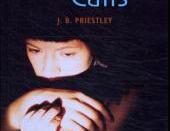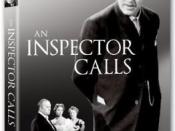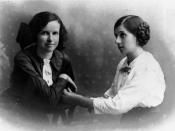ÃÂAn Inspector CallsÃÂ, by J.B. Priestley, is set in 1912 England, at a time when social divisions between different classes were huge. Eighty-seven percent of the countryÃÂs wealth belonged to just five percent of society, to people like Arthur Birling. Meanwhile, the remaining ninety-five percent of all the Eva Smiths and John Smiths have to get by on less than twenty-five shillings a week. Yet, as Priestley suggests throughout the play, the lives of the rich and poor are all intertwined together. The actions, words and thoughts of one can be of paramount importance to anotherÃÂs life. On the surface, this performance depicts a familyÃÂs reaction to an investigation by a very strange inspector. On a deeper level, however, it examines the core value of community and society, the idea that everyone should be responsible for their actions and for each other.
In the first act of the play, the stage opens with a normal family dinner, and a happy family celebrating an engagement.
Right at the beginning, Arthur BirlingÃÂs character is depicted as very arrogant and self-centered. This can be seen evidently in the long engagement monologue speech, in which he does not give anyone else a chance to talk. He tells Gerald and Eric that, ÃÂ YouÃÂll hear some people say that war is inevitable. And to that I say ÃÂ fiddlesticks!ÃÂ (Act 1, Page 6, Bottom) This is ironic to the audience, who know that the World War One started that very year. The playwright uses this dramatic irony to involve and immerse the audience in the play, and at the same time show how opinionated Arthur BirlingÃÂs character is. He is very stubborn and egotistic, which is one of the reasons why he is perhaps the one who is most responsible for Eva SmithÃÂs death. He refuses to consider giving Eva Smith and her co-workers a fairer wage, and instead fires her, which is what started the whole chain of events that lead to her death.
The Inspector then arrives, and changes the audienceÃÂs opinion of the Birlings. Inspector GooleÃÂs arrival is emphasized by its dramatic timing, which is right after Arthur tells the boys about how ÃÂA man has to make his own wayÃÂ but these cranks talk and writeÃÂ [about] community and all that nonsense...ÃÂ (Act 1, Page 10, Top) This once again accentuates BirlingÃÂs attitude of each man for himself, which is at the heart of his every action, and which lead to SmithÃÂs discharge.
As the Inspector interrogates each member of the family, the onlookers are gradually led to realize how different the reactions of the younger and older generation are towards their responsibilities. Although they are all guilty in some way, the parents refuse to accept the fact that they have wronged, while the younger ones realize their mistakes and feel bad for what they have done. How the family treated Eva Smith is but an example of how many of the upper class exploit the lower class, both physically and emotionally.
Birling does not feel reprehensible about firing Eva Smith at all. On the contrary, he feels that she is the one who is responsible. When Sheila asks Birling if he really did end SmithÃÂs employment, he replied without regret, ÃÂYes. The girl had been causing troubleÃÂ I was quite justified.ÃÂ The straightforward ÃÂyesÃÂ underscores how Birling accepts no responsibility for her death, which further shows how selfish and cocky he is.
The audience also sees how backward Arthur BirlingÃÂs priorities are, because he is even more concerned about his social status than real responsibility and regret for his familyÃÂs involvement in the murder. When the Inspector is interrogating Mrs. Birling about how she contributed to Eva SmithÃÂs death, Birling adds in, ÃÂI must sayàwhen this comes out at the inquest, it isnÃÂt going to do us much good.à(Act 2, Pg 45, Bottom) The author emphasizes, through this short dialogue, how he thinks that perhaps the ÃÂconscientiousàbehavior most socialites adopt is merely a façade to seem good to the rest of the world. They are actually selfish and uncaring, only seeking ways to climb further up the social ladder all the time. The words ÃÂwhen this comes outàsuggests how Arthur Birling merely thinks of the whole incident as an unfortunate scandal that might damage his reputation, not actually as someoneÃÂs precious life.
His wife has the same, if not worse, attitude towards her responsibility of her actions. Mrs. Birling shows the true side of her nature when she keeps blaming others with what should be her own duty. Throughout her explanation to the Inspector about what Eva Smith had said and done, she kept repeating ÃÂa lot of silly nonsenseÃÂ (Act II, Page 46) to his questions about what Smith had told her, emphasizing how she thought they were all lies. This shows how Sybil Birling shirks from responsibility, choosing to blame faults on others instead. Not only did she participate in killing the girl, she insists that Eva Smith was talking ÃÂnonsenseÃÂ and lying, accusing the girl of wrongdoing just like Arthur Birling. This makes her crime seem even worse, because one would have expected her to face the truth and repent instead.
At first, Gerald, like Birling, does not feel that he is responsible at all. On the contrary, his first reaction is to keep the truth from the Inspector. Gerald does not really accept the truth and responsibility for what heÃÂs done until he has started explaining his involvement with Eva Smith. This can be seen when Gerald suddenly breaks off from his confession and says, ÃÂSorry ÃÂ I- well, IÃÂve suddenly realized ÃÂ taken it in properly ÃÂ that sheÃÂs dead.ÃÂ (Act II, Page 35, Top) The short phrases emphasize the boyÃÂs distress, how much she really meant to him. He also uses the direct word ÃÂdeadÃÂ, unlike before when he used a euphemism for unpleasant things like ÃÂwomen of the townÃÂ (Act II, Page 34, Middle). This shows the magnitude of his feelings for what had happened, his shock at the truth that had been laid bare by the Inspector.
Unexpectedly, SheilaÃÂs reaction is even more stricken than GeraldÃÂs. When the audience first hears about how the two young siblings treated Eva Smith, they get the impression that the sister and brother are very mean and conceited. However, we learn that their hearts are in the right place, and they are the ones who actually learn a lesson from Inspector GooleÃÂs visit. Up until the end of scene one, Sheila is the only one who feels responsible. She tells the Inspector after she realizes it was her who made Eva Smith lose her last steady job, ÃÂItÃÂs the only time IÃÂve ever done anything like that, and IÃÂll never, never do it again to anybody.ÃÂ (Act I, Page 24, Bottom) This quotation shows how Sheila is perhaps the most conscientious in her family. The opposition of the words ÃÂeverÃÂ and ÃÂneverÃÂ, and the repetition with the word ÃÂneverÃÂ, emphasizes her regret about what she had done, how she clearly knows the result of her actions on Eva Smith. Her dramatic reactions, crying and running out hysterically, also emphasizes how guilty she feels about what she did. Sheila is almost obsessive about uncovering the truth on her familyÃÂs involvement with Eva Smith, which is the exact opposite of her parents, who try to cover things up.
It is not until near the end of the book that the extent of EricÃÂs involvement with Eva Smith becomes clear. In the beginning of Act III, Stage instructions state that ÃÂEric is standing just inside the roomÃÂ ÃÂ Then after the Inspector tells him that they know what he had done, ÃÂEric shuts the door and comes farther in.ÃÂ(Act III, Page 50-51, Top) EricÃÂs movement from being just by the door to coming ÃÂfarther inÃÂ symbolizes how he, too, is responsible for the death just like the others. The room is perhaps a representation of the confinement of the heart that they are all in, knowing that they had a hand in killing Eva Smith. They cannot get away from the Inspector, or from the guilt.
In one way or another, every one of the five main characters is responsible for Eva SmithÃÂs death. Arthur Birling turned her out onto the streets, Sheila took away her second job, Gerald kept her as his mistress then dumped her, Eric made her a single mother, and Mrs. Birling gave the final straw by refusing to give her help at her most desperate hour. However, the difference is their reactions to their responsibility, so the extent of their guilt can perhaps be measured by their responses to the suicide. I found ÃÂAn Inspector CallsÃÂ to be very interesting and enlightening. It made me realize how important our actions can be to other people in our society, through an amusing and suspenseful story.
Bibliography:An Inspector Calls, by J.B. Priestley, Heinemann Edition.





